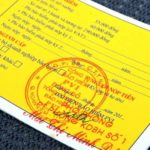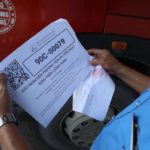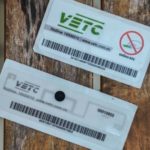Vehicle registration is a prerequisite for cars to obtain legal certification for road use. This process can be time-consuming and costly for vehicle owners. However, we are here to guide you through the necessary procedures and fees, which you will find outlined below.
1. Vehicle Inspection Procedures for Cars and Other Motorized Vehicles
According to Clause 2, Article 8 of Circular No. 70/2015/TT-BGTVT, “Organizations and individuals shall bring motor vehicles and relevant documents as prescribed in Clause 2, Article 5 of this Circular to the Vehicle Inspection Units for inspection.” The inspection procedure at the Vehicle Inspection Units is as follows:
Step 1: Organizations and individuals bring their vehicles and dossiers to the Vehicle Inspection Units.
Step 2: Reception and Inspection
Vehicle Inspection Units will receive and inspect the dossiers, cross-referencing them with the data on the vehicle management program. If the dossiers are incomplete or invalid, the vehicle owners will be guided to complete or rectify them (Vehicle Registration Certificates are considered invalid if there are signs of forgery, alterations, erasures, or if they are expired).
If the dossiers are complete and valid, the Vehicle Inspection Units will collect the fees and proceed to inspect and evaluate the technical safety and environmental protection of the motor vehicles. An inspection report will be printed.
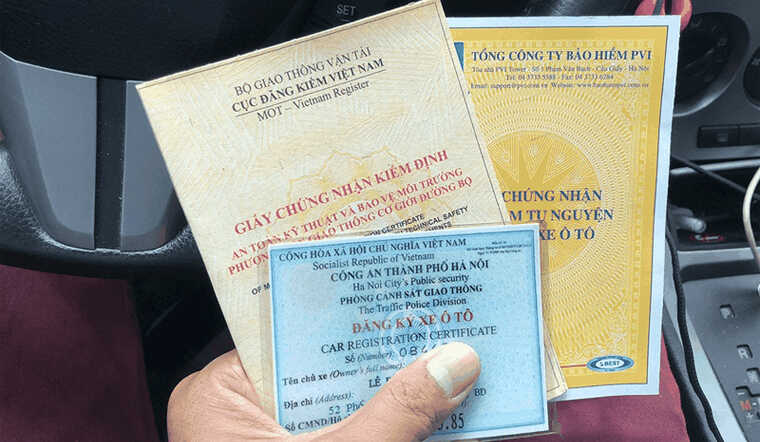 2021 Car Inspection Procedures
2021 Car Inspection Procedures
Step 3: Road Maintenance Fee Payment
If the motor vehicle passes the inspection, the Vehicle Inspection Units will collect the fees for issuing the Vehicle Inspection Certificates. The Vehicle Inspection Certificates, receipts for inspection and certificate issuance fees will be handed over to the vehicle owners immediately, and an inspection sticker will be affixed to the vehicle.
Step 4: Affixing the New Inspection Sticker
In cases where the motor vehicle only has a receipt for the Vehicle Registration Certificate, if it passes the inspection, only the inspection sticker will be affixed, and a receipt for the Vehicle Inspection Certificate will be given to the vehicle owner. When the vehicle owner presents the Vehicle Registration Certificate, the Vehicle Inspection Units will hand over the Vehicle Inspection Certificate.
If the motor vehicle has defects or malfunctions, the Vehicle Inspection Units will print and send a notice to the vehicle owner, informing them of the issues that need to be repaired or rectified. After the repairs are completed, the vehicle owner must bring the vehicle for inspection again.
For further reference:
2. Frequently Asked Questions about Car Inspection
What documents are required for car inspection?
The following documents and dossiers are mandatory for car inspection:
According to Clause 2, Article 5 of Circular No. 70/2015/TT-BGTVT, when bringing a vehicle to the Vehicle Inspection Units for inspection, the vehicle owner must present and submit the following documents and provide the relevant information:
Documents include:
+ Original Vehicle Registration Certificate issued by a competent state agency, or one of the following documents still in effect: Certified true copy of the Vehicle Registration Certificate with confirmation from the bank holding the vehicle as collateral; Certified true copy of the Vehicle Registration Certificate with confirmation from the financial leasing organization; Receipt for the Vehicle Registration Certificate.
+ Original Certificate of Motor Vehicle Civil Liability Insurance, which is still valid.
+ Original Certificate of Technical Safety and Environmental Protection Quality for Modified Motor Vehicles (for newly modified motor vehicles).
Additionally, you need to provide the login name, password, and website address of the vehicle’s journey supervision device for motor vehicles subject to journey supervision device installation.
What are the inspection periods (cycles) for different types of cars?
Non-commercial passenger cars with up to 09 seats
| Vehicle Type | Initial Cycle | Regular Cycle |
| Produced up to 07 years | 30 months | 18 months |
| Produced over 07 years up to 12 years | 12 months | |
| Produced over 12 years | 06 months |
Passenger cars with up to 09 seats for commercial use; passenger cars with more than 09 seats
| Vehicle Type | Initial Cycle | Regular Cycle |
| Without modification (*) | 18 months | 06 months |
| With modification (*) | 12 months | 06 months |
Cargo trucks of all types, specialized vehicles, tractor trucks, trailers, and semi-trailers
| Vehicle Type | Initial Cycle | Regular Cycle |
|
Cargo trucks of all types, specialized vehicles, and tractor trucks produced up to 07 years; trailers and semi-trailers produced up to 12 years: |
24 months | 12 months |
|
Cargo trucks of all types, specialized vehicles, and tractor trucks produced over 07 years; trailers and semi-trailers produced over 12 years: |
06 months | |
| With modification (*) | 12 months | 06 months |
Passenger cars with more than 09 seats produced from 15 years ago; cargo trucks of all types and tractor trucks produced from 20 years ago
– Regular Cycle: 03 months
What are the car inspection fees?
| Vehicle Type | Inspection Fee | Certificate Issuance Fee |
|
Cargo trucks with a cargo capacity of over 20 tons, tractor trucks with a cargo capacity of over 20 tons and other types of cargo vehicles: |
560,000 VND | 50,000 VND |
|
Cargo trucks with a cargo capacity from 7 tons to 20 tons, tractor trucks with a cargo capacity under 20 tons, and all types of trailers: |
350,000 VND | 50,000 VND |
| Cargo trucks with a cargo capacity from 2 tons to 7 tons | 320,000 VND | 50,000 VND |
| Cargo trucks with a cargo capacity under 2 tons | 280,000 VND | 50,000 VND |
|
Tractors, cargo vehicles with engines, passenger vehicles with four wheels and engines and similar types of vehicles: |
180,000 VND | 50,000 VND |
| Semi-trailers, trailers | 180,000 VND | 50,000 VND |
| Passenger cars with over 40 seats | 350,000 VND | 50,000 VND |
| Passenger cars with 25 to 40 seats | 320,000 VND | 50,000 VND |
| Passenger cars with 10 to 24 seats | 280,000 VND | 50,000 VND |
| Passenger cars with less than 10 seats | 240,000 VND | 50,000 VND |
| Ambulance | 240,000 VND | 100,000 VND |
| Three-wheeled vehicles and similar types of vehicles | 100,000 VND | 50,000 VND |
What are the road maintenance fees?
Road maintenance fees (road use fees) are a type of fee that vehicle owners must pay to maintain and upgrade roads for the benefit of all vehicles using those roads.
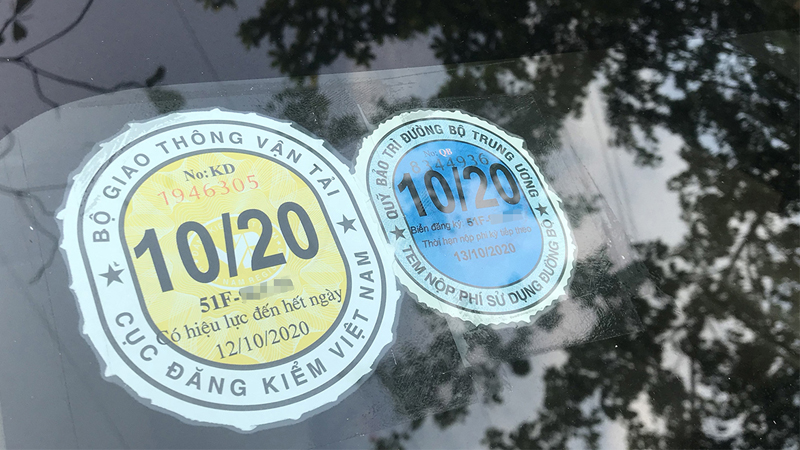 Road maintenance fee sticker affixed to the windshield after payment
Road maintenance fee sticker affixed to the windshield after payment
Typically, road maintenance fees are collected annually, and after full payment, a sticker is affixed to the windshield of the vehicle. Each sticker indicates the start and end dates of the fee payment period.
Here are the specific road use fees for 2021:
Passenger cars with less than 10 seats registered under an individual’s name
| Period | 1 month | 3 months | 6 months | 12 months | 18 months | 24 months | 30 months |
| Fee (VND) | 130,000 | 390,000 | 780,000 | 1,560,000 | 2,280,000 | 3,000,000 | 3,660,000 |
Passenger cars with less than 10 seats (except those registered under an individual’s name); cargo trucks, cargo vehicles with engines, and specialized vehicles with a total weight of less than 4,000 kg; all types of buses for public passenger transport (including buses for transporting students, pupils, and workers with subsidized fares); cargo vehicles and passenger vehicles with four wheels and engines
| Period | 1 month | 3 months | 6 months | 12 months | 18 months | 24 months | 30 months |
| Fee (VND) | 180,000 | 540,000 | 1,108,000 | 2,160,000 | 3,150,000 | 4,150,000 | 5,070,000 |
Passenger cars with 10 to 24 seats; cargo trucks, cargo vehicles with engines, and specialized vehicles with a total weight from 4,000 kg to less than 8,500 kg
| Period | 1 month | 3 months | 6 months | 12 months | 18 months | 24 months | 30 months |
| Fee (VND) | 270,000 | 810,000 | 780,000 | 1,620,000 | 3,240,000 | 4,730,000 | 6,220,000 |
Passenger cars
How to Obtain Motorcycle Insurance After an Accident
Do you want to know what documents are required to get motorbike insurance with Dien May XANH? Compulsory car insurance is a type of coverage that every motorbike owner should possess when on the road. It guarantees protection in the case of an unfortunate traffic accident, and the insurance company shall pay out based on its specific terms. Read on to discover what documentation is needed to obtain such a policy.
Registering for the Green Lane Online to Transport Essential Goods During COVID-19
Drivers and businesses in provinces and cities implementing social distancing measures due to the COVID-19 pandemic now need to apply for a vehicle identification card in order to be eligible to use green lanes for the transportation of essential goods. For further information, check out the article below.

























